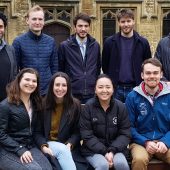
Dr Taha Yasseri
Former Senior Research Fellow
Taha Yasseri analyses large-scale transactional data to understand human dynamics, collective behaviour, collective intelligence and machine intelligence.

This project investigates the extent to which the characteristics of different political systems (for example, the number of major political parties) affect patterns of online information seeking behaviour which take place during election time (for example, the number and type of searches on Google for different politicians). It will use the European Parliament elections as a case study, examining information seeking patterns generated by the elections in 2009 and 2014 across the 28 member states of the European Union, and attempting to explain variation in these patterns through reference to the characteristics of the country in question. Data will be collected from two different platforms (Google and Wikipedia) and statistical methods will be applied to them to characterise the patterns of online information seeking behaviour.
The overall aim of the project is to enhance current research on the use of internet generated “big data” coming out of platforms such as Google, Wikipedia and Twitter for the purposes of election prediction. This is an area which has generated considerable interest in computer science and political science, yet also much disappointment, following the poor predictive power identified by much current research (for example, the number of times candidates are mentioned on Twitter has been found to bear little relation to overall electoral outcomes). The major reason for this, we argue, is that so far researchers have made no attempt to elaborate theoretically how social behaviour on the internet relates to overall electoral outcomes, and how this behaviour is driven by different political contexts. This study will take some first steps towards filling that gap. In so doing, we will also explore the role that online information seeking plays in contemporary democratic politics.
This project is funded by the John Fell OUP Research Fund.

Former Senior Research Fellow
Taha Yasseri analyses large-scale transactional data to understand human dynamics, collective behaviour, collective intelligence and machine intelligence.

Research Associate
In 2022 Jonathan Bright became the Head of AI for Public Services at the Turing Institute, having previously been a faculty member of the OII. A political scientist, he specialises in computational and ‘big data’ approaches to the social sciences.

Former MSc Student